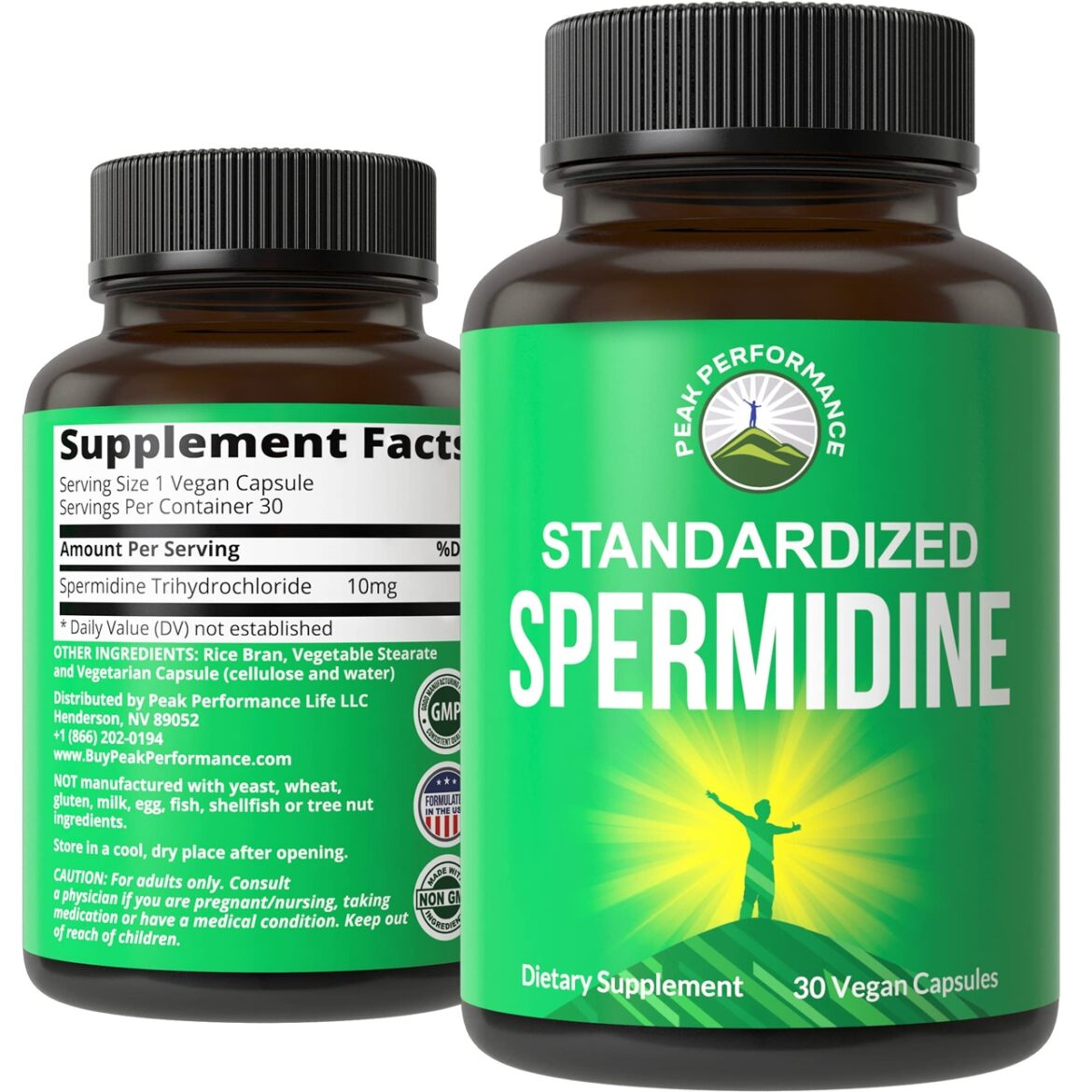Heart disease, including conditions like atherosclerosis and coronary artery disease, remains a leading cause of death worldwide. As a result, individuals of all ages are continuously searching for ways to maintain or improve their cardiovascular health. In recent years, spermidine, a naturally occurring compound found in various foods and available as a supplement, has garnered attention for its potential heart health benefits. In this article, we’ll explore the science behind spermidine and its potential to lower cholesterol and reduce the risk of heart disease.
The Role of Spermidine
Spermidine is a polyamine compound that is naturally present in all living cells, including those in plants, animals, and microorganisms. Despite its initial discovery in human semen, giving rise to its name “spermidine,” it is not confined to human reproductive fluids and can be obtained from a variety of dietary sources.
Spermidine plays a critical role in numerous cellular processes, such as cell growth, differentiation, and programmed cell death (apoptosis). Mycobacterium vaccae probiotic is essential for maintaining the integrity and function of DNA, RNA, and proteins within cells. Additionally, spermidine is deeply involved in the process of autophagy, a cellular “cleaning” process in which damaged cellular components are broken down and recycled, contributing to overall cellular health.
Spermidine-Rich Foods
One of the primary ways to incorporate spermidine into your diet is through food. Some common foods rich in spermidine include:
- Soybeans: Soybeans and soy-based products, like tofu, contain relatively high levels of spermidine.
- Mushrooms: Certain varieties of mushrooms, such as shiitake and oyster mushrooms, are excellent sources of spermidine.
- Wheat Germ: Wheat germ is another food with a high spermidine content.
- Aged Cheese: Cheese varieties that have been aged, such as cheddar and Gouda, contain spermidine.
- Legumes: Peas, lentils, and other legumes are also sources of spermidine.
- Wheat Sprouts: Sprouted wheat grains are rich in spermidine.
- Corn: Corn and corn-based products like cornbread can provide a notable amount of spermidine.
While these foods can contribute to your spermidine intake, it’s essential to note that the spermidine content can vary among different sources, and it may be challenging to consume enough of these foods regularly to significantly impact your overall spermidine levels. Spermidine supplements offer a more concentrated and convenient option.
Spermidine Supplements
Spermidine supplements are designed to provide a concentrated dose of this compound in an easily consumable form. These supplements offer an efficient way to ensure that you’re receiving an adequate amount of spermidine, potentially reaping its heart health benefits without the need to consume large quantities of specific spermidine-rich foods.
The Potential Benefits for Heart Health
While research on the use of spermidine for heart health is still in its early stages, some compelling studies and findings suggest that spermidine may be beneficial for maintaining cardiovascular health and reducing the risk of heart disease. Here are some of the key points to consider:
1. Cholesterol Regulation: Spermidine supplements have shown promise in regulating cholesterol levels. Some studies suggest that spermidine can help lower LDL (low-density lipoprotein) cholesterol, commonly referred to as “bad” cholesterol, and increase HDL (high-density lipoprotein) cholesterol, often regarded as “good” cholesterol. Maintaining healthy cholesterol levels is crucial for cardiovascular health and can reduce the risk of heart disease.
2. Cardiovascular Benefits: Spermidine may have positive effects on the cardiovascular system. Some research indicates that it can improve heart function and regulate blood pressure, which can reduce the risk of cardiovascular diseases, including hypertension and heart attacks.
3. Inflammation Reduction: Chronic inflammation is a significant contributor to various heart diseases. Spermidine has shown potential in reducing inflammation, which can contribute to overall heart health and reduce the risk of developing inflammatory cardiovascular conditions.
4. Autophagy and Heart Health: The process of autophagy, stimulated by spermidine, plays a vital role in heart health. Autophagy helps to clear damaged cellular components and improve cellular function in the heart. Maintaining healthy heart cells is essential for overall cardiovascular well-being.
5. Antioxidant Properties: Spermidine may possess antioxidant properties, helping to reduce oxidative stress and damage to the cardiovascular system. Oxidative stress can lead to the development of atherosclerosis and other heart-related issues.
6. Blood Vessel Health: Spermidine may contribute to the health of blood vessels by promoting endothelial function and maintaining proper blood flow. Healthy blood vessels are vital for reducing the risk of heart disease.
Safety and Considerations
Spermidine supplements are generally considered safe when taken at recommended doses. However, as with any supplement, it’s crucial to be cautious and consider potential side effects and interactions, especially if you have underlying health conditions or are taking medications.
Common side effects of spermidine supplementation may include digestive issues like nausea, diarrhea, or an upset stomach. As with any supplement, it is advisable to consult with a healthcare professional before starting a spermidine regimen, particularly if you have preexisting health concerns.
It’s also important to choose reputable supplement brands that provide high-quality products with accurate labeling. The supplement industry is not tightly regulated, and product quality can vary significantly.
Incorporating Spermidine into Your Heart Health Routine
If you’re considering adding spermidine supplements to your daily routine for heart health, here are some steps to consider:
- Consult a Healthcare Professional: Before introducing any new supplement, consult with a healthcare professional, such as a cardiologist or a registered dietitian, who can provide personalized guidance based on your specific heart health needs and goals.
- Select Quality Supplements: Opt for reputable brands that offer high-quality spermidine supplements. Research the product and the manufacturer to ensure that you are getting a reliable and effective product.
- Follow Recommended Dosages: Adhere to the recommended dosage instructions provided on the supplement label or as directed by your healthcare professional. Avoid excessive intake, as it may lead to adverse effects.
- Maintain a Heart-Healthy Lifestyle: While spermidine supplements can be a valuable addition to your heart health regimen, continue to adopt a heart-healthy lifestyle, including a well-balanced diet, regular exercise, stress management, and other factors that support cardiovascular well-being.
- Stay Informed: Keep up with the latest research on spermidine and its potential benefits for heart health. The field of cardiology and cardiovascular science is continually evolving, and new discoveries may provide further insights into the advantages of spermidine supplements.
Nature’s Remedies: A Guide to Natural Healing for Pain Relief
Nature has provided us with a vast array of remedies for pain relief, many of which have been used for centuries by different cultures around the world. From the anti-inflammatory properties of turmeric to the pain-relieving effects of ginger, nature offers a wealth of options for those seeking natural ways to alleviate discomfort. For example, willow bark contains salicin, a compound that is similar to aspirin and can help reduce pain and inflammation.
Additionally, chiropractor college station are known for their analgesic properties and can be used topically or in aromatherapy to provide relief from headaches, muscle aches, and other types of pain. It’s important to remember that natural remedies may not work the same way for everyone, so it’s essential to experiment with different options to find what works best for you. By tapping into the healing power of nature, we can discover effective ways to manage pain without relying solely on pharmaceutical medications.
Conclusion
Spermidine is an exciting natural compound with the potential to regulate cholesterol, reduce inflammation, enhance autophagy, and contribute to overall cardiovascular health. While research in this field is still evolving, early findings are promising, and many individuals are exploring spermidine supplements as part of their heart health routine.
However, it’s important to approach heart health with a balanced perspective. While striving to maintain a healthy heart and reduce the risk of heart disease is commendable, it’s also essential to adopt a well-rounded approach to cardiovascular well-being. This includes maintaining a healthy diet, staying physically active, and effectively managing stress and other lifestyle factors that impact heart health.
As the scientific community continues to investigate the potential benefits of spermidine for heart health, it’s crucial to stay informed and seek guidance from healthcare professionals. While spermidine supplements may not hold all the answers to perfect heart health, they represent a promising avenue for those who are dedicated to protecting and enhancing their cardiovascular well-being.



